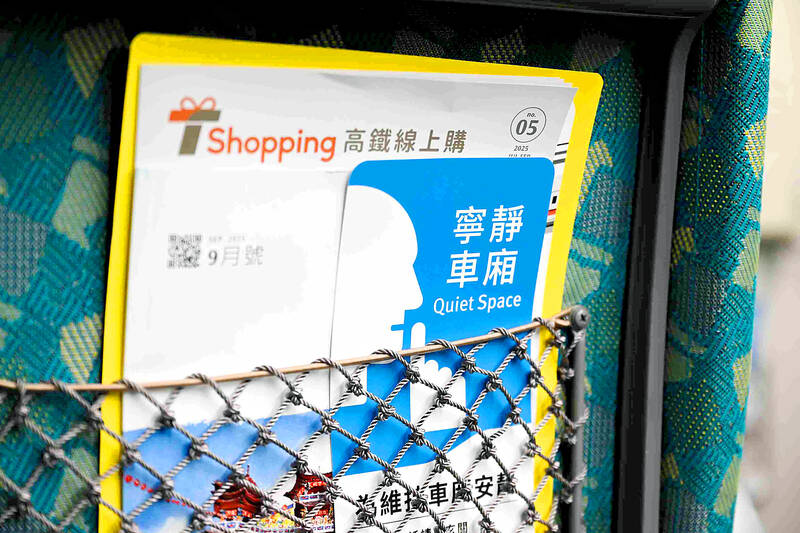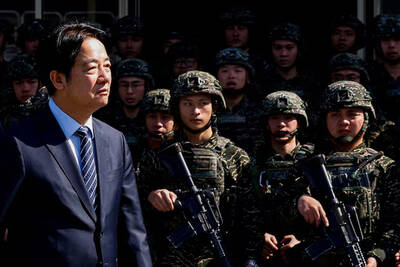A senior transport official on Saturday defended Taiwan High Speed Rail Corp’s (THSRC) newly implemented “quiet carriage” policy, after people criticized it for “targeting families with children.”
The policy, which took effect on Sept. 22, targets disruptive behavior rather than children, focusing on passengers making loud phone calls or using electronic devices without headphones, Ministry of Transportation and Communications Secretary-General Shen Hui-hung (沈慧虹) said in a Facebook post.
“Infants, young children and passengers with medical conditions affecting autonomy would continue to receive care and understanding from staff,” Shen said.

Photo courtesy of THSRC
Her remarks came amid public debate over the policy, which has drawn criticism after being perceived by some people as “unfriendly” toward families.
One social media post recounted an alleged incident in which a mother traveling with two young children was shown a sign by staff asking her to lower the children’s voices. She took her younger child to the carriage doorway, leaving the older one in the seat, it said.
Shen said that when she recently traveled on a high-speed train, children were not disruptive and passengers with pets were accommodated without issue.
“The intent is clear: mutual respect,” she said, adding that the policy addresses behaviors adults can control rather than unavoidable noises from infants or passengers with medical needs.
Obstetrician Su Yi-ning (蘇怡寧) on Wednesday last week said true “quietness” is not achieved through suppression, but understanding.
“If a society cannot tolerate the next generation’s cry, then there would be no next generation,” he said, adding that “silencing the weak is not civilization.”
Su made the remarks on his Facebook page, responding to a post by an Internet user who talked about his experience of encountering a child who was screaming and crying behind his seat during a recent THSR ride from Tainan to Taipei.
The user said that he had endured the screaming and crying for five minutes before he had enough and shouted at them.
He wrote that he had argued with the mother and a food trolley salesperson, calling people whom he deemed noisy “morons” and parents “imbecilic,” and concluding that in nature, the weak and clueless deserve to be hunted down.
Children do not deliberately make noise to annoy people, but because they are incapable of controlling their emotions, and the THSR’s quiet carriage was not meant to exclude children, Su said.
“The quietness of the policy was never intended to be achieved through suppression, but through everyone being willing to take a step back and understand that parents are also making an effort,” Su said.
When children are noisy, their parents might also be under stress, but other people might not notice that, Su said.
Child-hating remarks are often disguised as rational, but are an extension of discrimination, he said, adding that “the civilization of humans is not based on silencing the weak, but on the strong choosing to be kind.”
“True quietness comes from understanding, not suppression, and for sounds to coexist, not disappear,” he said, adding that children’s crying is a way of learning to communicate, so people can dislike it, but should not despise it.
That the Internet user misused the “survival of the fittest” principle to rationalize human cruelty was “absurd,” he added.

The Taipei Mass Rapid Transit (MRT) Wanda-Zhonghe Line is 81.7 percent complete, with public opening targeted for the end of 2027, New Taipei City Mayor Hou You-yi (侯友宜) said today. Surrounding roads are to be open to the public by the end of next year, Hou said during an inspection of construction progress. The 9.5km line, featuring nine underground stations and one depot, is expected to connect Chiang Kai-shek Memorial Hall Station to Chukuang Station in New Taipei City’s Jhonghe District (中和). All 18 tunnels for the line are complete, while the main structures of the stations and depot are mostly finished, he

The first global hotel Keys Selection by the Michelin Guide includes four hotels in Taiwan, Michelin announced yesterday. All four received the “Michelin One Key,” indicating guests are to experience a “very special stay” at any of the locations as the establishments are “a true gem with personality. Service always goes the extra mile, and the hotel provides much more than others in its price range.” Of the four hotels, three are located in Taipei and one in Taichung. In Taipei, the One Key accolades were awarded to the Capella Taipei, Kimpton Da An Taipei and Mandarin Oriental Taipei. Capella Taipei was described by

Minister of Economic Affairs Kung Ming-hsin (龔明鑫) yesterday said that private-sector refiners are willing to stop buying Russian naphtha should the EU ask them to, after a group of non-governmental organizations, including the Centre for Research on Energy and Clean Air (CREA), criticized the nation’s continued business with the country. While Taiwan joined the US and its Western allies in putting broad sanctions on Russia after it invaded Ukraine in 2022, it did not explicitly ban imports of naphtha, a major hard-currency earner for Russia. While state-owned firms stopped importing Russian oil in 2023, there is no restriction on private companies to

President William Lai (賴清德) is expected to announce a new advanced “all-domain” air defense system to better defend against China when he gives his keynote national day speech today, four sources familiar with the matter said. Taiwan is ramping up defense spending and modernizing its armed forces, but faces a China that has a far larger military and is adding its own advanced new weapons such as stealth fighter jets, aircraft carriers and a huge array of missiles. Lai is expected to announce the air defense system dubbed “Taiwan Dome” in his speech this morning, one of the sources said. The system